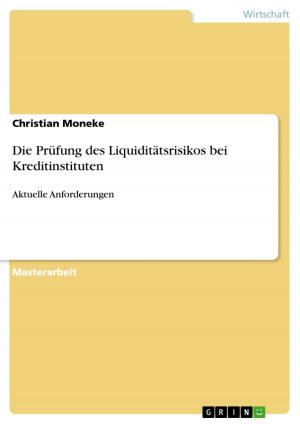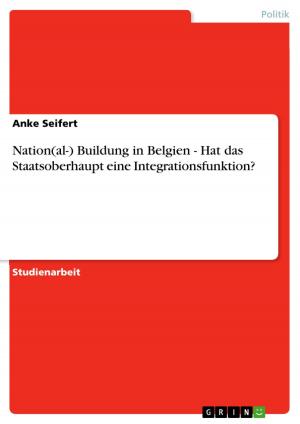How Significant are Soft Skills to Line Managers in an Aviation Engineering Organisation?
Business & Finance, Management & Leadership, Management| Author: | Mark Galea | ISBN: | 9783668078703 |
| Publisher: | GRIN Verlag | Publication: | November 2, 2015 |
| Imprint: | GRIN Verlag | Language: | English |
| Author: | Mark Galea |
| ISBN: | 9783668078703 |
| Publisher: | GRIN Verlag |
| Publication: | November 2, 2015 |
| Imprint: | GRIN Verlag |
| Language: | English |
Master's Thesis from the year 2014 in the subject Business economics - Business Management, Corporate Governance, grade: Merit, University of Malta (Faculty of Economics, Management and Accountancy), course: Executive Masters in Business and Administration, language: English, abstract: Aviation engineering is a highly technical line of work, and most certainly a high level of technical skills, also known as hard skills, are required for technically maintaining aircraft. However, this research study investigates a group of aircraft engineers and their respective line managers, who themselves are also aircraft engineers, to outline the current perception of soft skills and its significance to these line managers in this particular aviation engineering organisation. Following this investigation, it is the objective of this study to elicit possible beneficiary recommendations for further recognition of the aviation engineering profession's esteem. The aviation engineering industry has been evolving for over a century to keep up with technological improvements and the professional culture of the personnel working in this industry requires a continuous adaptation to changes in business requirements. Engineering in aviation has been proven to be a direct link in the aviation safety chain, however, in due to the fact that this line of work is often executed in restricted areas of airports, it is secreted from the general public, and is therefore very poorly promoted and is very rarely a research attraction for social scientists. The access available to the author as an aircraft engineer within the researched organisation, grants the possibility to carry out primary research on the subject group of employees. Literature review findings concerning five soft skill attributes and their relation to both engineering in general, as well as aviation engineering, are investigated to discover their relation to front line management in this organisation, and to expose if these skills can be related to aviation safety. Several findings emerged through this qualitative research. A deprivation of soft skills awareness in a formal manner is evident as training is omitted. A promotion deficiency together with an isolation of the operations of the aviation engineer's profession is leading to an underprivileged estimation, and a degradation in the aretefact cultural level. Positive outcomes are also exposed with regards to regular use of physical communication and the tendency of self-interest towards soft skills development in an experiential manner. Conclusions imply that a further development of soft skills among the group in study shall have an indirect impact on the end product of this team, positively effecting safety.
Master's Thesis from the year 2014 in the subject Business economics - Business Management, Corporate Governance, grade: Merit, University of Malta (Faculty of Economics, Management and Accountancy), course: Executive Masters in Business and Administration, language: English, abstract: Aviation engineering is a highly technical line of work, and most certainly a high level of technical skills, also known as hard skills, are required for technically maintaining aircraft. However, this research study investigates a group of aircraft engineers and their respective line managers, who themselves are also aircraft engineers, to outline the current perception of soft skills and its significance to these line managers in this particular aviation engineering organisation. Following this investigation, it is the objective of this study to elicit possible beneficiary recommendations for further recognition of the aviation engineering profession's esteem. The aviation engineering industry has been evolving for over a century to keep up with technological improvements and the professional culture of the personnel working in this industry requires a continuous adaptation to changes in business requirements. Engineering in aviation has been proven to be a direct link in the aviation safety chain, however, in due to the fact that this line of work is often executed in restricted areas of airports, it is secreted from the general public, and is therefore very poorly promoted and is very rarely a research attraction for social scientists. The access available to the author as an aircraft engineer within the researched organisation, grants the possibility to carry out primary research on the subject group of employees. Literature review findings concerning five soft skill attributes and their relation to both engineering in general, as well as aviation engineering, are investigated to discover their relation to front line management in this organisation, and to expose if these skills can be related to aviation safety. Several findings emerged through this qualitative research. A deprivation of soft skills awareness in a formal manner is evident as training is omitted. A promotion deficiency together with an isolation of the operations of the aviation engineer's profession is leading to an underprivileged estimation, and a degradation in the aretefact cultural level. Positive outcomes are also exposed with regards to regular use of physical communication and the tendency of self-interest towards soft skills development in an experiential manner. Conclusions imply that a further development of soft skills among the group in study shall have an indirect impact on the end product of this team, positively effecting safety.















